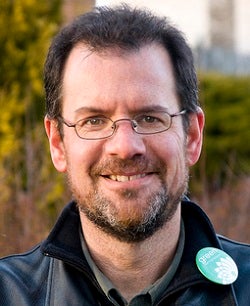
Byron Williston, IC3 member and associate professor in the Philosophy department at Wilfrid Laurier University, will be speaking on his newly released book, The Anthropocene Project,at Laurier’s Waterloo campus on September 29th. The book attempts to make philosophical sense of the grave threat posed by climate change to civilization.
The Anthropocene Project positions climate change as a crisis of values. Williston argues that Enlightenment values like truthfulness, hope and justice are vital in helping us to address the crisis. Only if humans are guided by these values in the process of formulating climate policies can climate-induced disaster be avoided, according to Williston.
“For decades, scientific studies reported environmental degradation at unprecedented rates caused by human activities, but prominent scientists realized that mere discussions of cause and effect and more scientific data are not enough to address questions related to the core values that define human's relationship with nature,” said Hind Al-Abadleh, associate professor in the Department of Chemistry and Biochemistry at Laurier and organizer of this event. “Dr. Williston's book helps us navigate the moral dimension of the environmental crisis in the era of climate change. The book also offers a positive outlook based on the universal virtues of justice, truthfulness, and hope. These virtues – if embraced and consciously acted upon by our generation – will hopefully mitigate some of the negative impacts of climate change for a more livable planet for future generations.”
Williston will also participate in a discussion after the lecture with Simon Dalby, IC3 member, Centre for International Governance Innovation (CIGI) Chair in the Political Economy of Climate Change and professor of Geography and Environmental Studies at Laurier. Dalby will bring his perspective on the security aspect of climate change. A question and answer period will follow the discussion.

The Anthropocene Project is available at good bookshops, or directly from the Oxford University Press.
Article extracted from Wilfrid Laurier University's website.